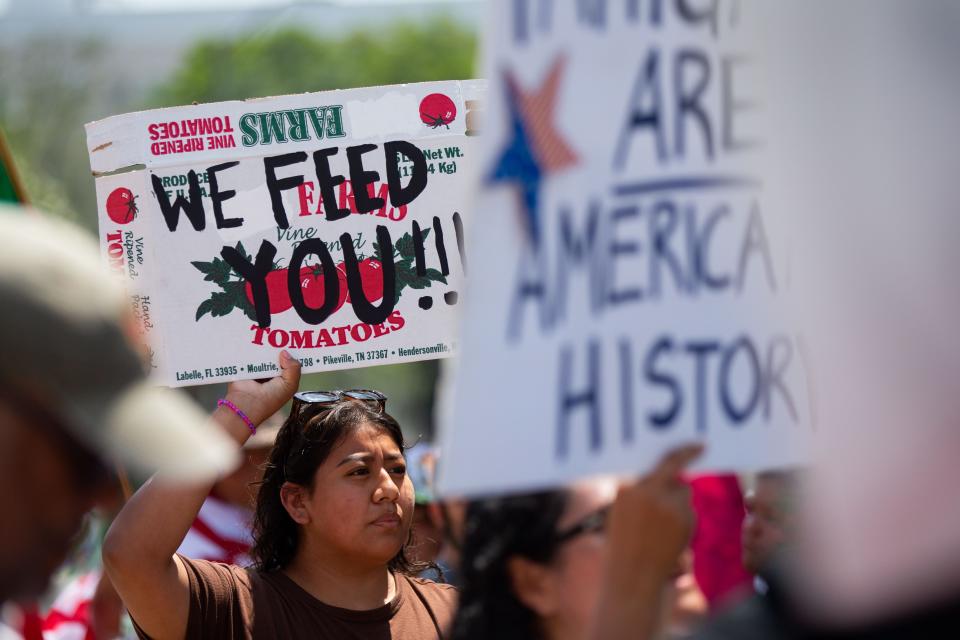Unintended consequences of Florida’s ‘Anti-Illegal Immigration legislation’
- Oops!Something went wrong.Please try again later.
Gov. Ron DeSantis touted SB 1718 as the strongest anti-illegal immigration legislation in the country. He signed it into law on May 10 (effective July 1, 2023).
The news release asserted, “In Florida, we will not stand idly by while the federal government abandons its lawful duties to protect our country. The legislation I signed today gives Florida the most ambitious anti-illegal immigration laws in the country… ensuring the Florida taxpayers are not footing the bill for illegal immigration.”

Under our constitutional framework immigration, refugee protection and asylum are federal matters; neither state nor local governments have independent authority that would pass constitutional muster.
Some aspects of the legislation are being challenged in court while others, like allocating an additional $12 million to continue an Unauthorized Alien Transport Program to relocate “illegal immigrants to sanctuary jurisdictions” are being scrutinized.
'60 Minutes' reported recently that a Texas sheriff was pursuing criminal charges involving Florida's relocation of about 50 putative Venezuelan asylum seekers from San Antonio (not Florida) to Massachusetts, alleging fraud given purported misrepresentations that induced them to "volunteer" to be flown to Martha's Vineyard essentially as a political stunt.
For perspective, SB 1718 broadly conflates people seeking asylum, in other words safe haven from persecution that’s an acknowledged right under both international and U.S. law, with “illegal immigrant,” a colloquial phrase. Other lawful federal immigration statuses like humanitarian parole and temporary protected status also appear to be misconstrued.
Historical context tends to be elusive – today affords timely opportunity to reflect as we move forward.
On December 12 family, staff, friends and as well as some political opponents of the late Florida Gov. Lawton Chiles convened in Tallahassee to commemorate the 25th anniversary of his unanticipated death three weeks before the end of his second term.
During the ‘90s when tens of thousands of people from Cuba and Haiti risked their lives to reach Florida shores in almost anything that would float, Chiles’ assessment was similar -- the federal government failed to adequately enforce U.S. immigration law. However, his response was decidedly different.
Chiles refrained from vilifying people navigating such desperation and displacement. He advanced innovative strategies intended to avoid and offset state and local impact. This entailed both taking an adversarial posture, while exploring opportunities for collaboration with his federal counterparts.
I served as special counsel to Gov. Chiles and staffed his immigration initiatives. I briefed Florida Senate leadership on point 12 years ago during a three-day workshop on immigration issues. I provided public comment during deliberations by the Florida Senate’s Fiscal Policy Committee on April 25 when SB 1718 was on the agenda.
Chilling effects that could adversely impact community policing by undermining the willingness of certain non-U.S. citizens to report criminal activity they witness to avoid drawing attention to themselves are often overlooked.
So local communities may be less safe.
Similarly, some non-U.S. citizens may be dissuaded from seeking necessary medical attention for communicable diseases or other health maladies due to the new data collection provisions.
So local public health priorities may be jeopardized.

The New American Economy Research Fund (self-identifies as a bipartisan research and advocacy organization promoting smart federal, state, and local immigration policies) observed such state legislation can adversely impact agribusiness, and other key industries.
Former U.S. Representative Al Lawson (who represented FL-5 prior to recent redistricting which encompassed parts of Tallahassee to Jacksonville and served on the House Agriculture Committee) noted similar concerns.
Research by Migration Policy Institute, a nonpartisan think tank in Washington, D.C., has identified implications to other significant aspects of Florida’s workforce, in particular involving Florida’s construction industry.
The challenges are complex, and the surrounding narratives are compelling… even if not always well-founded.
I aligned recently with Rambana & Ricci, P.L.L.C., a noted Tallahassee-based immigration law firm specializing in complex litigation and related administrative matters, in an “Of Counsel” role to help shape public discourse.
I’ve engaged with a diverse and highly respected community of subject matter experts over time, including Emilio Gonzalez, United States Citizenship director for President George W. Bush; Gil Kerlikowske, US Customs and Border Protection commissioner for President Obama; Susan Martin, US Commission on Immigration Reform executive director and Doris Meissner, US Immigration and Naturalization Service commissioner for President Clinton, among others.
Ideally, you’ll hear from us again soon.

Mark Schlakman, Esq., FSU Center for the Advancement of Human Rights, and Of Counsel to Rambana & Ricci, P.L.L.C.
JOIN THE CONVERSATION
Send letters to the editor (up to 200 words) or Your Turn columns (about 500 words) to letters@tallahassee.com. Please include your address for verification purposes only, and if you send a Your Turn, also include a photo and 1-2 line bio of yourself. You can also submit anonymous Zing!s at Tallahassee.com/Zing. Submissions are published on a space-available basis. All submissions may be edited for content, clarity and length, and may also be published by any part of the USA TODAY NETWORK.
This article originally appeared on Tallahassee Democrat: Unintended results of state's ‘Anti-Illegal Immigration legislation’

